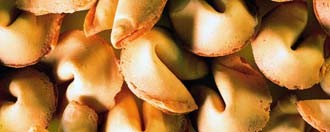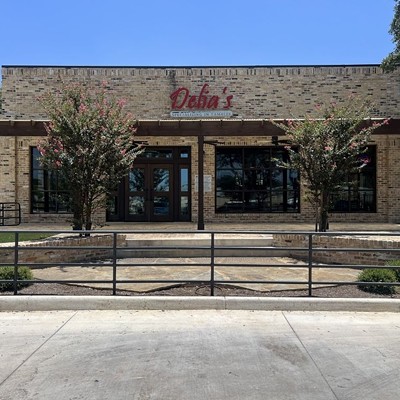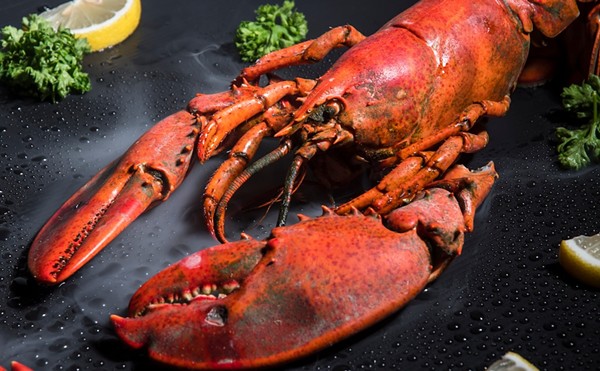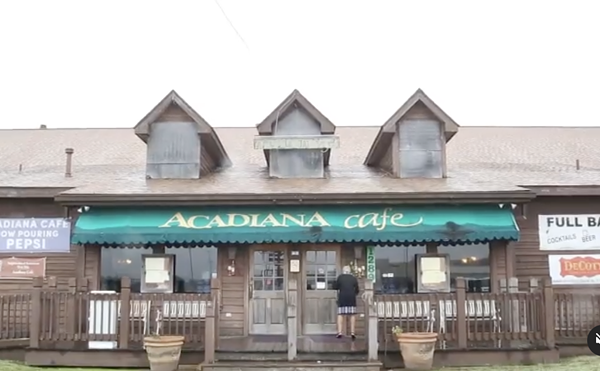|
This thriving business is going Wong's way I meet Derrick Wong, vice president of sales and marketing for Wonton Food Inc., and Richard Leung, a salesperson, in front of an anonymous-looking warehouse in Queens, New York. Though Wong is diminutive and Leung is bullish, they both wear polo shirts with chinos. Through the warehouse doors, there are boxes as far as the eye can see, stacked in pallets from the floor to the 30-foot ceiling, being transferred from place to place by an unsmiling carrier via forklift. There must be thousands of boxes in this 9,500-square-foot space. What is more astounding than sheer volume are the contents: fortune cookies. For the believers among us, contemplating all of those fortunes in all of those boxes presents a conundrum. It's difficult enough at a Chinese restaurant to try to discern "which one is meant for me," but in the presence of millions of fortunes, the question takes on greater, existential proportions.
"This whole thing could only last us one and a half days," says Leung, motioning to the towers of cookies in our midst. "If a trailer doesn't come for one day, we're in trouble." The dusty interior of the Golden Bowl offices resembles some kind of social club: dirty linoleum, fake wooden desks, garishly colored Chinese calendars, chimes, and basketball posters. For Wong, a mild-mannered man in his thirties, this is a family business. His uncle started Wonton Food Inc. as a noodle company and Asian dry-goods importer in 1973 on East Broadway in Manhattan.
Golden Bowl's operation is entirely automated. A batter of mostly flour, eggs, and sugar is mixed upstairs and transported through a pipe into the main facility, which feeds a machine that releases drops of batter onto heated plates on which the cookies bake like pancakes. A fortune is deposited onto the still-soft cookie disk that is then folded mechanically into its claw-like shape. This entire process happens almost instantaneously. The cookies are made in four flavors: citrus; the East Coast favorite, vanilla; the West Coast favorite, chocolate; and "fun fun fortune cookie," a novelty cookie that combines all three flavors. The idea for the citrus cookie, says Wong, came from the orange wedges served at the end of the meal in many Chinese restaurants.
While the roots of fortune cookies can be traced back to 14th-century China as a clandestine form of communication - Chinese soldiers transferred secret messages via moon cakes - the likelier origins were American. In 1918, David Jung, a noodle manufacturer in Los Angeles, handed out cookies that contained uplifting messages as a promotional gimmick. To this day the tradition persists. Golden Bowl has more than 400 distributors, selling their cookies all over the U.S., in Puerto Rico, Canada, and Europe.
"In the U.S.," says Wong, in faintly accented English, "people look for the cookie after the bill, and they ask for the cookie if they don't get it." Wong claims that the company was the first to print lucky numbers on the backs of fortunes, and one of the first to feature "Learn Chinese." Golden Bowl also does personalized fortunes and advertisements. When asked how that works, Leung explains, "On the back we'll have a message that says you'll meet a dark and handsome stranger and so on and so forth," says Leung, "and on the back we'll have `a website`."
So, where do the fortunes come from? As one might suspect, Golden Bowl writes their own and hires freelancers to help them. Their criteria? "Basically it's got to be happy," says Leung. "It's got to have some kind of meaning to it. Most , it cannot be offensive." • This story originally appeared in New York Press and is distributed by Featurewell.com.
|
A fortune in cookies
Wed, Nov 24, 2004 at 12:00 am
Tags:

KEEP SA CURRENT!
Since 1986, the SA Current has served as the free, independent voice of San Antonio, and we want to keep it that way.
Becoming an SA Current Supporter for as little as $5 a month allows us to continue offering readers access to our coverage of local news, food, nightlife, events, and culture with no paywalls.
Scroll to read more Flavor articles
Newsletters
Join SA Current Newsletters
Subscribe now to get the latest news delivered right to your inbox.














